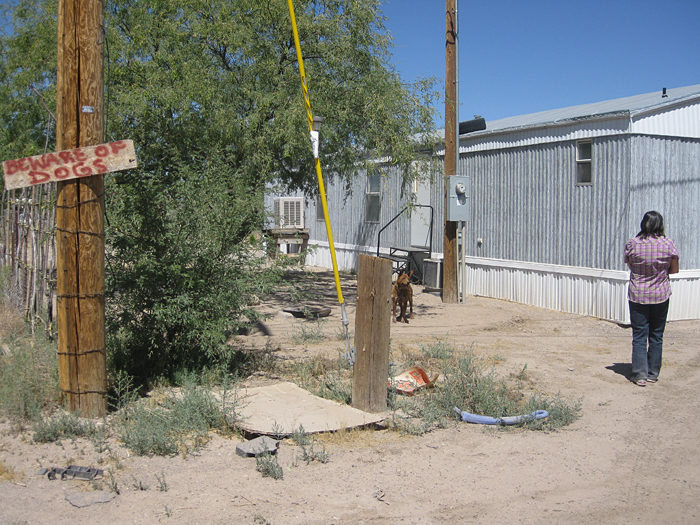You are here
Reducing Rocky Mountain Spotted Fever in a Tribal Reservation in Arizona
 One of the components I appreciate the most about public health is its intersection with a myriad of professional fields, sectors and partners. Recently, I had the opportunity to represent the CDC Foundation and participate in field work for the Rocky Mountain Spotted Fever (RMSF) project; a project exemplifying the role public health plays in partnerships, engaging the community, and implementing targeted interventions to improve community health. The goal of the RMSF project is to reduce the number of brown dog ticks which carry the RMSF disease. The project is currently piloted in a small community of a tribal reservation in Arizona. While only a small percentage of brown dog ticks carry RMSF, these ticks are attracted to dogs that roam in abundance in this community, carrying the ticks associated with 200 reported human cases of RMSF and more than 14 deaths in 2011. Since this is a small community, most members have been directly impacted by the disease or know someone who has been affected.
One of the components I appreciate the most about public health is its intersection with a myriad of professional fields, sectors and partners. Recently, I had the opportunity to represent the CDC Foundation and participate in field work for the Rocky Mountain Spotted Fever (RMSF) project; a project exemplifying the role public health plays in partnerships, engaging the community, and implementing targeted interventions to improve community health. The goal of the RMSF project is to reduce the number of brown dog ticks which carry the RMSF disease. The project is currently piloted in a small community of a tribal reservation in Arizona. While only a small percentage of brown dog ticks carry RMSF, these ticks are attracted to dogs that roam in abundance in this community, carrying the ticks associated with 200 reported human cases of RMSF and more than 14 deaths in 2011. Since this is a small community, most members have been directly impacted by the disease or know someone who has been affected.
 This project is testing the strategy of combining homeowner education, pesticide application and dog population control to reduce the number of brown dog ticks and the potential for transmitting RMSF to humans. Homeowners are trained in basic yard maintenance and the application of over-the-counter pesticide to eliminate ticks, protecting both their family members and their dogs. The pesticide application on the yards and treatment of the dogs with tick collars also keep the tick populations in check. Finally, spay and neuter surgeries help control the dog population that harbors the ticks that endanger dog and human health.
This project is testing the strategy of combining homeowner education, pesticide application and dog population control to reduce the number of brown dog ticks and the potential for transmitting RMSF to humans. Homeowners are trained in basic yard maintenance and the application of over-the-counter pesticide to eliminate ticks, protecting both their family members and their dogs. The pesticide application on the yards and treatment of the dogs with tick collars also keep the tick populations in check. Finally, spay and neuter surgeries help control the dog population that harbors the ticks that endanger dog and human health.
I had never been to Arizona, so even though the heat was spiking well over 100 degrees, I jumped at the opportunity to participate. My first impression of the reservation was its remote location and the limited resources available to the community. Secondly, I was struck by the diverse and unique partnership that was established to address this health issue. Veterinary students from the Virginia-Maryland Regional College of Veterinary Medicine and North Dakota University volunteered to perform spay and neuter surgeries helping control the dog population. The Centers for Disease Control and Prevention, Indian Health Service and the Arizona Health State Department collaborated with the tribe’s health department to educate homeowners about RMSF, how to properly care for their dogs and apply insecticide to their yards, and identify early symptoms of the disease prompting proper medical attention. In addition, the project also received tremendous support from the tribe’s Animal Control department and Community Health Representatives (similar to public health nurses) who were familiar with the communities and households and were able to serve as a link to the community and the project interventions. The CDC Foundation was instrumental in connecting with PetSmart Charities. Through the partnership, PetSmart generously provided support to purchase the medical supplies and equipment needed for veterinarians to perform several hundred spay and neuter surgeries.
It was quite exciting and humbling to work with such a talented and committed team collaborating towards a common goal to reduce RMSF in this community.
I felt proud to be a part of this effort and I look forward to learning more about the interventions and the sustainability of these partnerships to improve the health of the community.
On behalf of the CDC Foundation I express sincere gratitude to the partners and especially the tribe for their hard work, dedication and their role in connecting us to the community to protect people and dogs from RMSF.
Photos by: Brooke DiPetrillo, CDC Foundation and Craig Manning, CDC